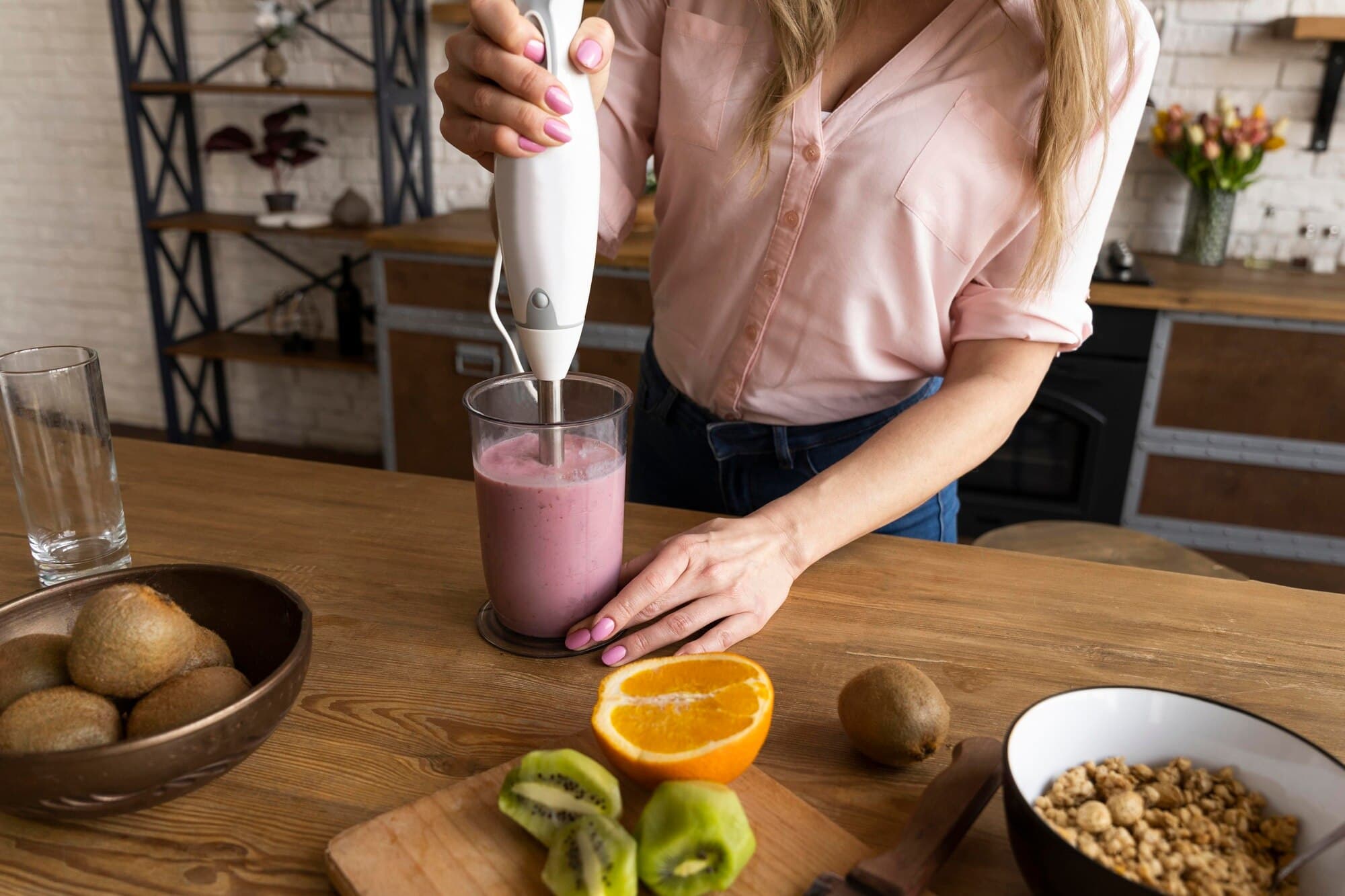Back to blog
The Real-Life Guide to Healthy Living

A Fresh Start to Healthy Living
Sustainable Healthy Habits
The Importance of Movement and Sleep
Mindfulness and Stress Management
Food Swaps and Combinations
Healthy Meal Delivery
Sustainable Healthy Habits
The Importance of Movement and Sleep
Mindfulness and Stress Management
Food Swaps and Combinations
Healthy Meal Delivery
As we transition into a new season, it's the perfect time to embrace a fresh start and reset our habits. The end of a busy season can offer a fresh start, allowing us to build new healthy habits that feel right and fulfilling, rather than restrictive and limiting.
What truly counts is taking the first steps. Start small and simple and be kind to yourself. Remember, there is no such thing as a quick fix; consistency is key, and the most rewarding results will be revealed in the long run. In this article, we will discuss what to avoid and what to lean into, coupled with suggestions for healthier alternatives you can use to inspire your healthy living routine and lifestyle.
A Fresh Start to Healthy Living
Resetting your routine starts with building simple, sustainable habits such as daily breathwork, movement, quality sleep, and a balanced diet that supports both health and wellbeing through making you feel more energized, and connected to your body and mind.
Sustainable Healthy Habits

Rather than overwhelming yourself with rigid goals or unrealistic expectations, take small, manageable steps to develop healthier habits. Start with incorporating a 5-minute meditation or breathwork session into your daily routine, as it gradually becomes part of your day. Focus on adding more plant-based foods to your meals. Also, movement and quality sleep are equally important. To help you on your way, we've made a list of tips to keep you on track:
Food Should Look Like Food
As we all know, food is natural medicine, which is why your health journey should begin with a healthy diet. One of the simplest yet most effective ways to reset is by nourishing your body without compromise. Get the most nutrient dense foods and embrace plant-based options. It’s best to steer clear of refined sugar, red meat, and refined carbohydrates during a reset, all of which can negatively impact your blood sugar and overall health. To maintain good health with food intake follow these tips:
- Eat regularly
- Include protein in your diet
- Include a variety of colorful vegetables
- Balance blood sugar levels with fibre
- Ditch sugar and processed foods
- Minimize stimulants like caffeine
Read more about sugar alternatives.
Movement and Keeping Fit
A fresh start also includes listening to your body’s need for movement and rest. Move for your body and your mind. Feel lighter, brighter and more energized. Whether it's regular exercise, or resistance training, swimming, or pilates, moving your body in a way that feels good is crucial to maintaining energy and mental clarity. Even a walk in the park or scheduling a workout with a friend once a week, can greatly contribute to healthy weight management.
The Power of a Good Night's Sleep

Recent research has highlighted that the relationship between nutrition and sleep goes both ways. To improve the quality of your sleep, reduce your intake of stimulants like sugar and caffeine, which can disrupt rest. Instead, try calming herbs such as chamomile or lavender to promote relaxation before bed. Aim for 8 hours of restful, uninterrupted sleep to allow your body to recover and rejuvenate. Lack of sleep can increase hunger and cravings for high-calorie foods, making it harder to manage your weight. Establishing a calming bedtime routine can help you get the rest you need for a healthy body and a calm mind. Examples include:
- Reading a book before sleep
- Journaling or writing down a to do list for the next day
- Avoid blue lights and screens before bedtime
- Increase exposure to natural light during the day
- Sleep and wake up at regular times daily
- Fuel your body with sleep enhancing nutrients like vitamin c, melatonin and potassium
Read about insomnia and solutions.
Mindfulness and Stress Management
Stress is a significant contributor to weight gain, particularly in the form of emotional eating and unhealthy cravings. When you’re stressed, your body activates the “fight or flight” response, which suppresses digestion and redirects energy to other areas. Mindfulness practices like meditation, yoga, and deep breathing can help manage stress levels. Practicing conscious breathing can help you relax and reduce stress. Taking time to slow down and focus on the present moment can also help you tune into your body, try taking a walk in nature or a hike in the mountains. Here are a few more tips to help you beat stress:
- Have a plate of vegetables for every meal.
- Take a cold shower in the morning every other day.
- Pick different exercise methods twice every week.
- Walk for 30-60 mins daily.
- Cook a new plant based recipe once a week.
- Start with 5 minutes of meditation or breathwork each day, gradually increasing by one minute each week.
- Spend time outdoors and connect with nature.
Food Swaps, Alternatives and Combinations
- Replace sugary snacks for fruits, like in smoothies, to satisfy cravings and nourish your body with vital vitamins and minerals. Avoid sweeteners and added sugars at all costs.
- Switch red meat with high protein plant-based options, try quinoa, lentils, and beans, or go for lean animal sources like oily fish and white meat.
- Trade white carbs for whole grains like brown rice and quinoa offering many health benefits thanks to their rich content of antioxidants, fiber, and essential nutrients. Just be mindful of portion sizes to stay aligned with your health goals.
- For more plant-based options, pair your meals with a salad on the side, making use of dark leafy greens. You can also swap convenience snacks for healthier appetizers, such as hummus with carrots. These choices can greatly benefit your gut health and support weight management.
- Consuming vitamin C alongside iron in a meal enhances iron absorption, potentially increasing it fourfold. Examples: beans with red pepper or broccoli and kale with orange.
- To improve the absorption of fat-soluble vitamins, try to combine vitamins A, D, E and K with healthy fats, like; berries with nuts and seeds, or eggs with avocado.
- Calcium and Vitamin D are the perfect match for bone health. Pairings can be salmon or mushrooms with leafy greens like kale or spinach.
- Swap caffeine with herbal teas or water.
Read more about the sources of fiber and healthy fats.
Healthy Living Made Easy
Craving delicious and fresh meals delivered to your door? Explore our current healthy meal plans menu for a taste of summer's most nourishing flavors. Perfectly prepped and portioned to fit your needs. Choose your daily meals on the Calo App and start each day on a good note.
FAQs
What happens in the body when you get stressed?
When you get stressed, your body reacts with the "fight or flight" response, which includes:
- The release of stress hormones adrenaline and cortisol
- An increase in blood sugar (and release of insulin)
- Raised blood pressure
- Rapid heartbeat
How many calories should I get a day from food?
An average man needs 2,500kcal a day, while an average woman needs 2,000kcal a day.
Why might the Mediterranean diet be the answer to a healthy lifestyle?
This diverse food source, rich in healthy fats and dietary fiber, is highly beneficial for overall well-being due to its varied nutritional content.
Read more about Mediterranean diets.
Read more about Mediterranean diets.
Once you create a routine that feels right for you, it will shift from something you have to do to something you want to do. Small, consistent changes, like ditching processed foods in favor of fruits and vegetables, lead to lasting transformation. Prioritize what feels good, and the rest will naturally follow. Your healthy living is what truly matters. Read more about Olive oil benefits and Face yoga and many more topics on the Calo Blog.









